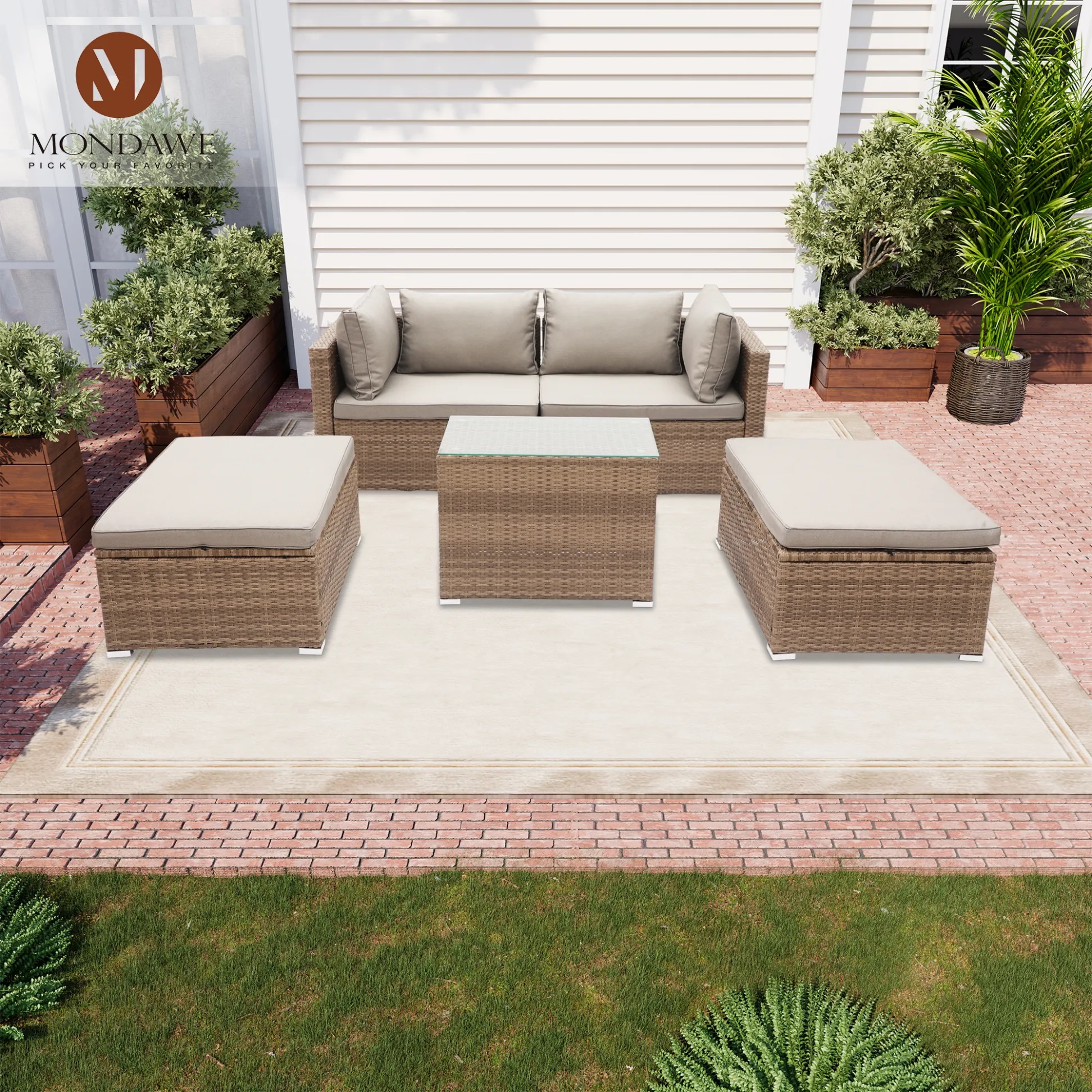Which Is Better Fire Pit or Patio Heater?
Dec 01,2023 | MONDAWE
As the temperature drops, outdoor gatherings and activities become less comfortable without proper heating. Choosing between a fire pit and patio heater can be a daunting task. In this article, we will provide a comprehensive comparison to help you decide which option is better for your needs.
About Fire Pits
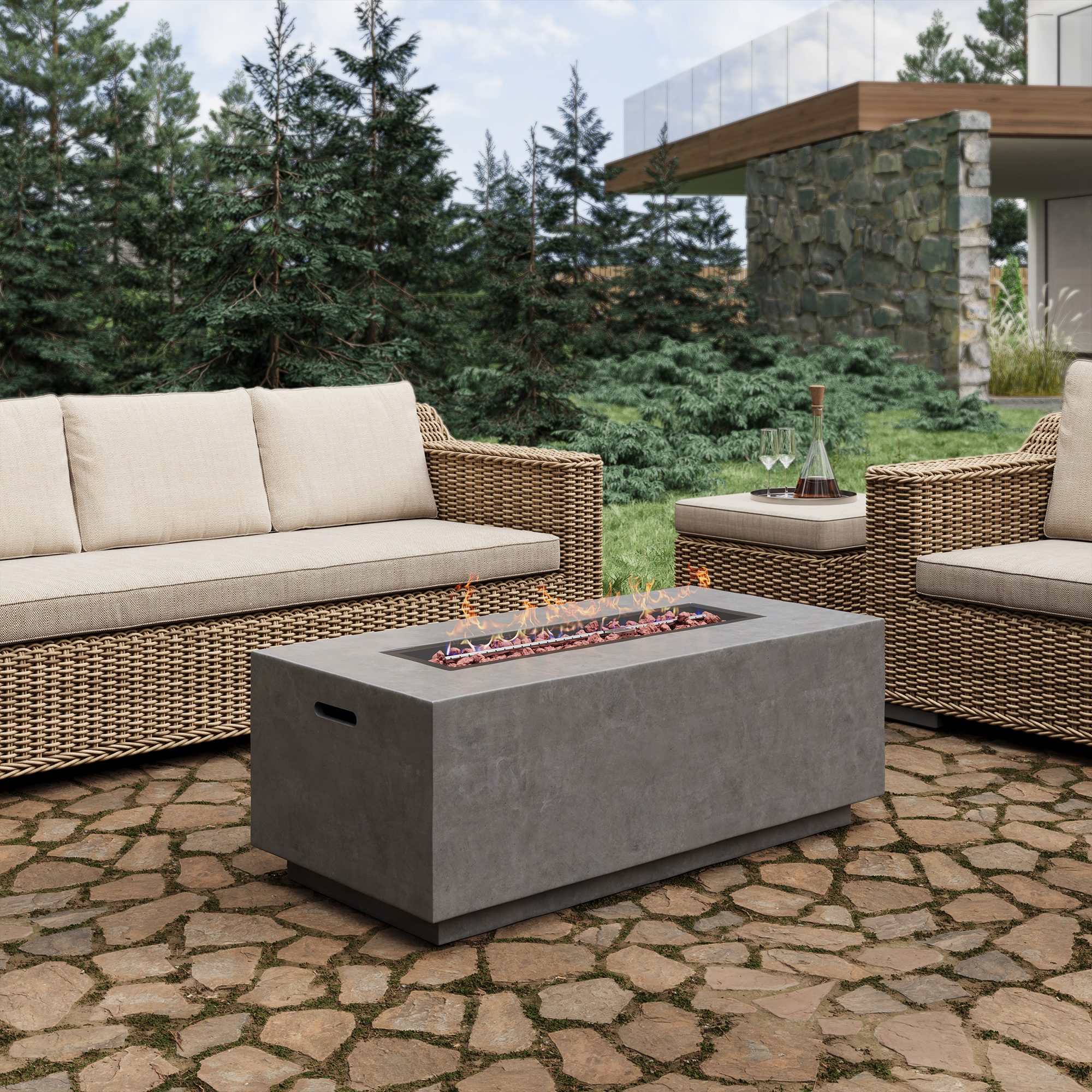
A fire pit is a designated area or structure designed for containing and safely enjoying an open fire outdoors. It typically consists of a fireproof bowl or pit where the fire is contained, often surrounded by a heat-resistant material such as stone, brick, or metal.
Types of Fire Pits
There are several types of fire pits available, each offering different features and benefits. Here are the most common types:
-
Fire Pit Tables: Fire pit tables combine the functionality of a fire pit with a tabletop surface. They often feature a built-in fire pit in the center, surrounded by a tabletop where you can place drinks, snacks, or even cook meals. Fire pit tables are available in various shapes and sizes, and they can be fueled by wood or gas. They are a popular choice for outdoor dining and entertaining, providing both warmth and a convenient surface for socializing.
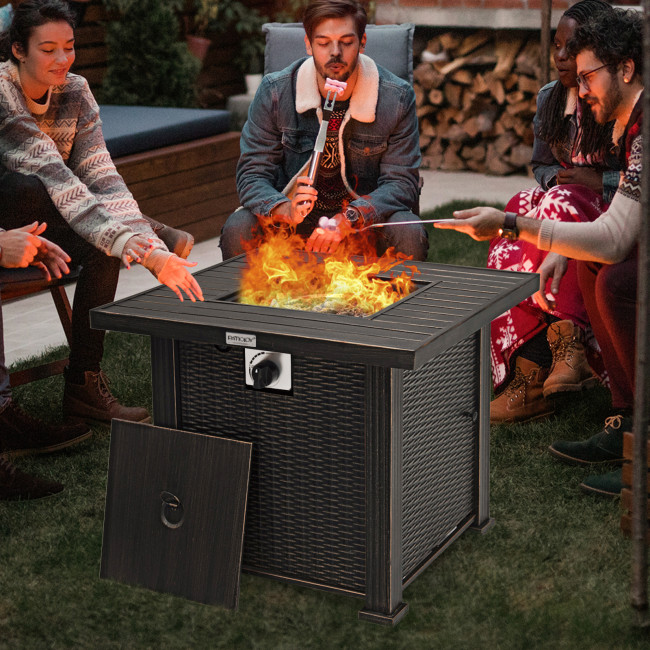
-
Wood-Burning Fire Pits: These fire pits use wood as fuel, providing a traditional and authentic fire experience. They create a warm and cozy ambiance with crackling flames and the aroma of burning wood. Wood-burning fire pits often have a grate or mesh screen to contain the fire and promote airflow. They require a steady supply of firewood and proper ventilation.
.png?w=1024&h=1024)
-
Gas-Powered Fire Pits: Gas fire pits use natural gas or propane as fuel. They offer convenience and control, allowing you to adjust the flame height and heat output with a knob or switch. Gas fire pits are often equipped with burners and lava rocks or ceramic logs to simulate the appearance of a real wood fire. They are cleaner burning than wood-burning fire pits, with no smoke or ash to deal with. However, they require a gas supply and proper installation.
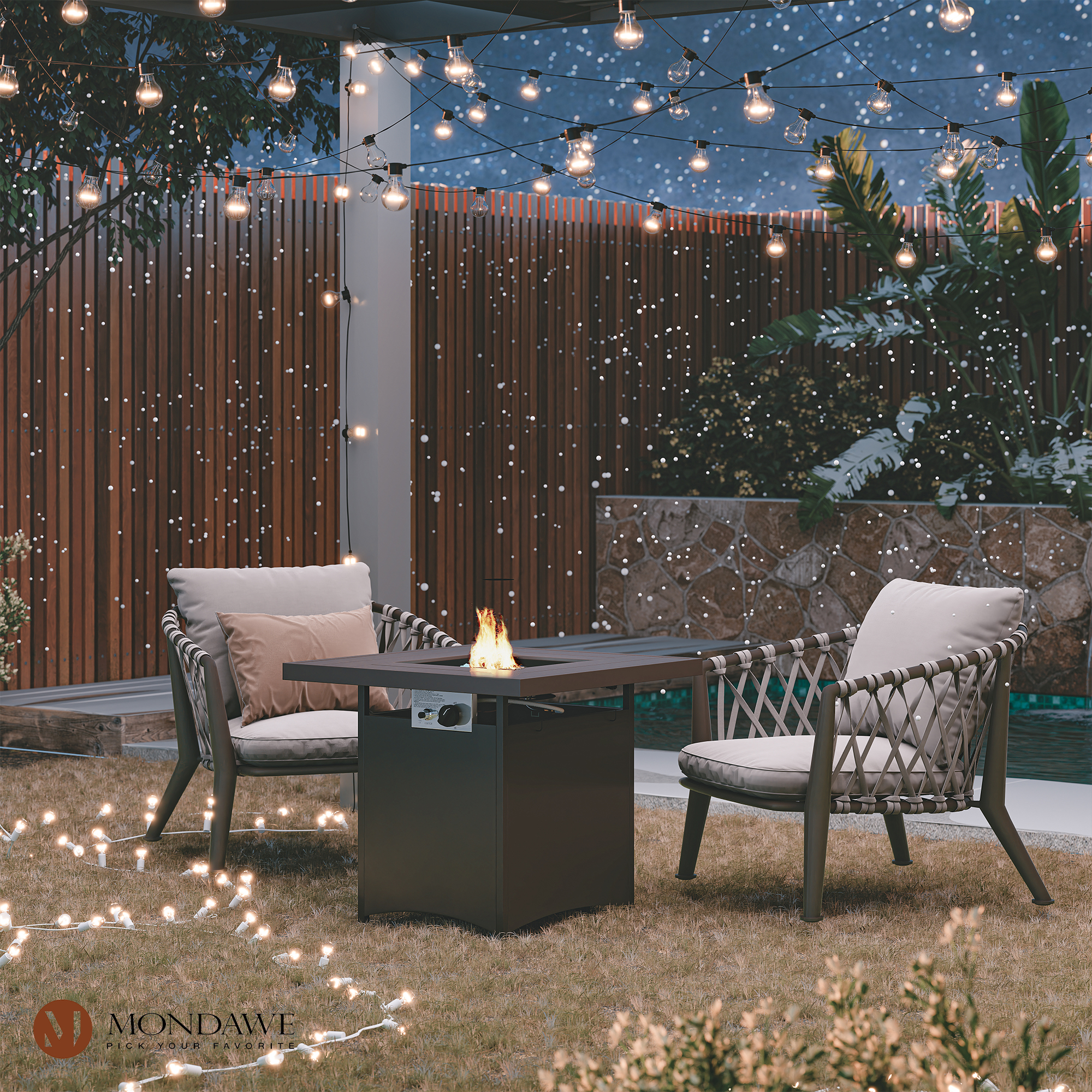
Mondawe's Propane Gas Fire Pit
-
Portable Fire Pits: Portable fire pits are designed for easy transportation and versatility. They come in various sizes and styles, including compact tabletop models and collapsible options. Portable fire pits are typically fueled by wood or propane and can be used in different outdoor settings, such as camping trips, picnics, or beach gatherings. They offer convenience and flexibility for those who want to enjoy a fire pit experience on the go.
.jpeg?w=1600&h=1600)
Pros |
Cons |
|
Authentic and Rustic Atmosphere: Fire pits create a warm and inviting ambiance, with flickering flames and the crackling sound of burning wood, adding a natural and cozy feel to outdoor spaces. |
Emission of Smoke and Odor: Wood-burning fire pits produce smoke, which can be bothersome to some individuals, especially those with respiratory sensitivities. The smoke can also leave a lingering odor on clothing and nearby surfaces. And depending on your location, there may be specific regulations or restrictions on the use of fire pits. |
|
Versatility for Cooking and Roasting: Fire pits provide the opportunity to cook food over an open flame, whether it's roasting marshmallows for s'mores or grilling meats and vegetables on a grate or skewers. They offer a unique outdoor cooking experience. |
Safety Concerns with Open Flames: Fire pits involve an open flame, which requires caution and responsible supervision. There is a risk of accidental burns or fire if proper safety measures are not followed, particularly when children or pets are present. |
|
Wide Range of Design Options: Fire pits come in various styles, sizes, and materials, allowing you to choose a design that complements your outdoor decor and personal taste. They can be customized to fit your specific aesthetic preferences. |
Maintenance and Cleaning Requirements: Fire pits need regular maintenance to keep them in good condition. This includes cleaning out ash and debris, inspecting and maintaining burners or gas lines (if applicable), and ensuring proper ventilation. Wood-burning fire pits also require a constant supply of firewood. |
About Patio Heaters
Patio heaters typically feature a tall, freestanding design with a heating element located at the top. A patio heater is a device designed to provide heat and warmth to outdoor spaces such as patios, decks, or outdoor seating areas. It is used to extend the usability and comfort of outdoor areas during cooler weather conditions.
Types of Patio Heaters
-
Propane Patio Heaters: Propane patio heaters are popular and widely used. They are fueled by propane gas from a portable tank that is typically housed in the base of the heater. Propane heaters provide a convenient and portable heating solution for outdoor spaces. They often have adjustable heat settings and can emit a significant amount of heat.
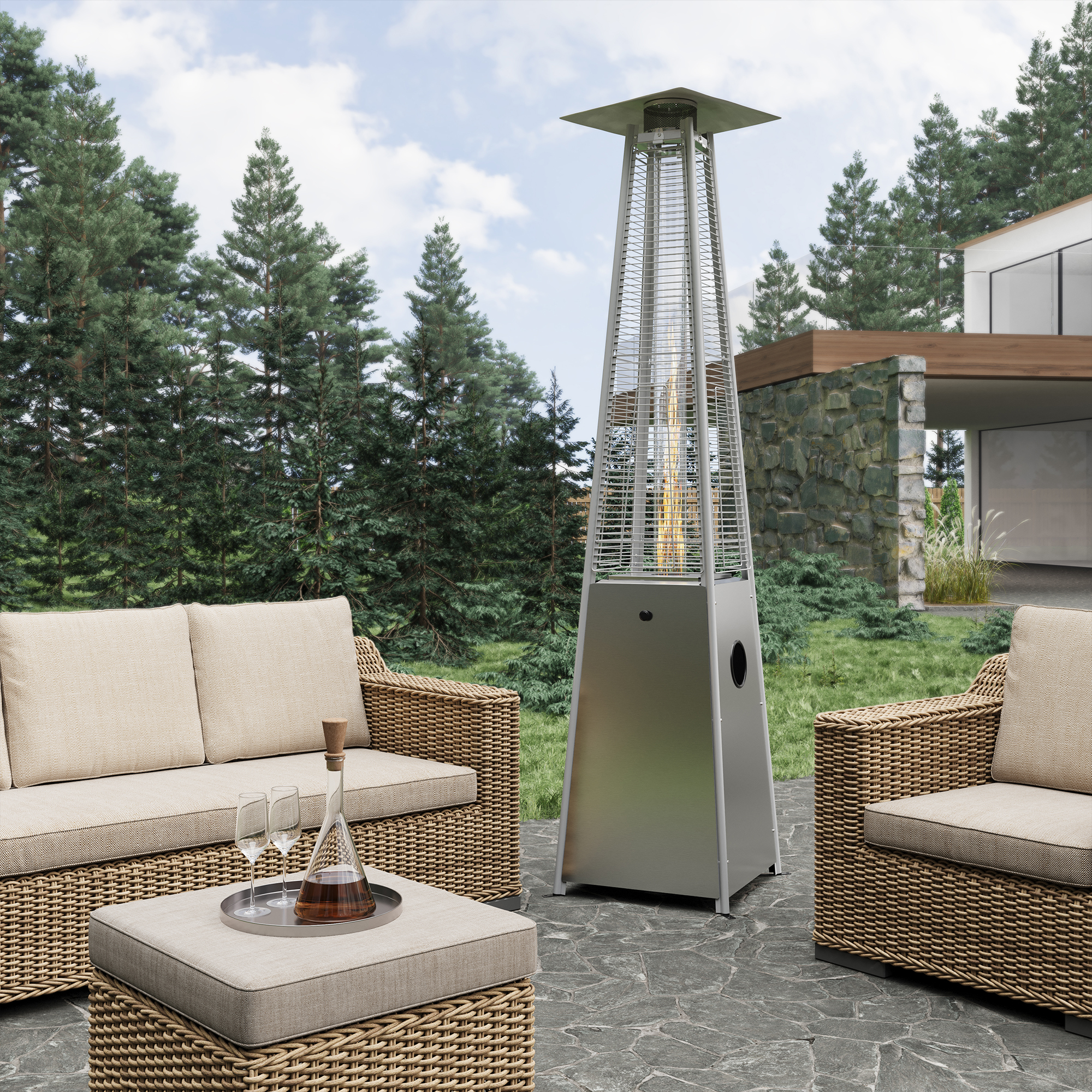
Mondawe's Patio Propane Heater
-
Natural Gas Patio Heaters: Natural gas patio heaters are connected to a fixed natural gas line, making them a more permanent heating option for outdoor areas. They require professional installation and are typically mounted to a structure or attached to a natural gas line. Natural gas heaters offer a continuous fuel supply and are often more powerful than propane heaters.
-
Electric Patio Heaters: Electric patio heaters are powered by electricity and require a power source, such as an electrical outlet or hardwired connection. They provide consistent and efficient heat without the need for fuel tanks or gas lines. Electric heaters are generally easy to use and maintain, but they may require proximity to a power source and have limited portability.
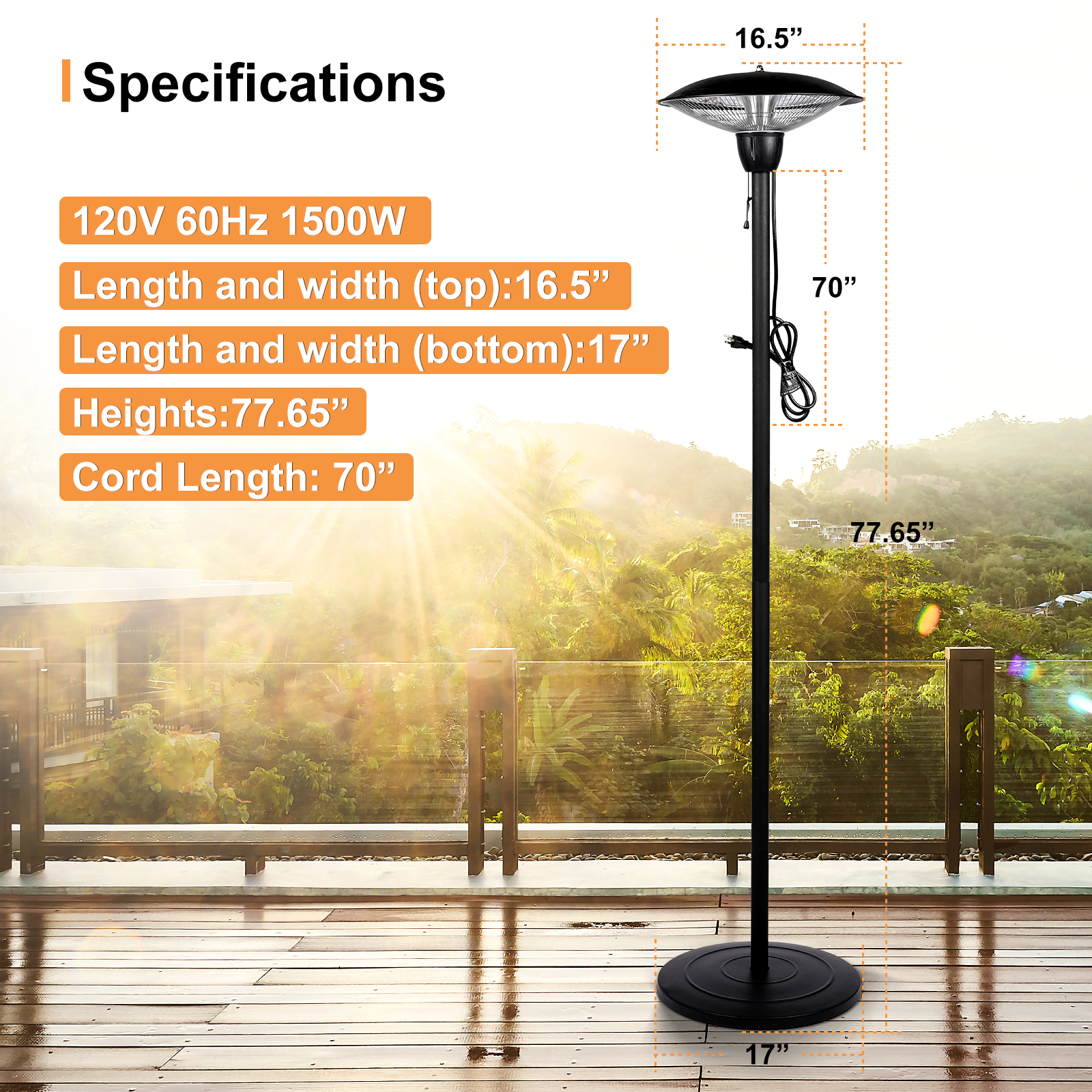
Mondawe's Patio Electric Heater
-
Infrared Patio Heaters: Infrared patio heaters use infrared radiation to directly heat objects and people in its path, rather than heating the surrounding air. They emit radiant heat that is absorbed by objects, providing immediate warmth without heating the air in between. Infrared heaters are available in various fuel types, including propane, natural gas, and electric.
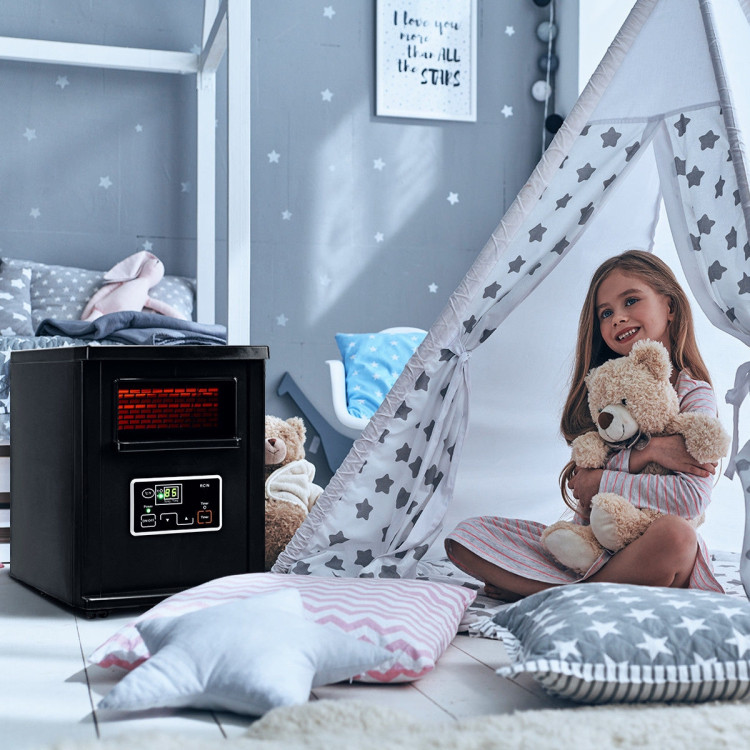
Mondawe's Infrared Patio Heater
-
Tabletop Patio Heaters: Tabletop patio heaters are smaller in size and designed to be placed on outdoor tables or other surfaces. They provide localized heat and are ideal for small gatherings or dining areas. Tabletop heaters are usually powered by propane gas or electricity and offer convenience and portability.

Mondawe's Tabletop Patio Heater
Pros |
Cons |
|
Extended Outdoor Use: Patio heaters allow you to enjoy outdoor spaces for longer periods, even during cooler weather conditions, by providing warmth and comfort. |
Limited Heat Range: Depending on the type and size of the patio heater, the heat range may be limited, making it more suitable for smaller outdoor areas rather than large open spaces. |
|
Versatile Heating Options: They come in various types and fuel sources, including propane, natural gas, and electric, giving you flexibility to choose a heater that suits your needs and preferences. |
Fuel Requirements and Costs: Patio heaters that use propane or natural gas require a fuel source, which can incur ongoing costs. Propane tanks need to be refilled or replaced, while natural gas heaters require a connection to a gas line. |
|
Adjustable Heat Settings: Many patio heaters have adjustable heat settings, allowing you to customize the level of warmth according to your comfort. |
Safety Concerns: Patio heaters involve open flames or heating elements, and safety precautions must be taken to prevent accidents or injuries. They should be used with caution, and proper clearances from combustible materials should be maintained. |
|
Portable and Easy to Use: Some patio heaters are designed to be portable, making it easy to move and position them wherever heat is needed. They are generally user-friendly and require minimal setup. |
Maintenance and Upkeep: Patio heaters need regular maintenance to ensure their proper functioning and longevity. This may include cleaning, inspection, and occasional replacement of parts. |
Which Is Better for Your Home?
When choosing between a fire pit and a patio heater for your home, consider the following factors to determine which option is better suited for your needs:
-
Intended Use: Determine how you plan to use the outdoor space.
| Fire Pit | Let you gather around a fire, enjoy the ambiance, and cook over an open flame. |
| Patio Heater | Provide warmth and extend outdoor comfort during cooler weather. |
- Space and Size: Consider the size of your outdoor area.
| Fire Pit | Occupy more space and may require a designated area for installation. |
| Patio Heater | Be more compact and can be placed in smaller areas. |
Assess the available space and choose the option that fits well and allows for proper clearance and ventilation.
-
Local Regulations: Check for any local regulations or restrictions regarding the use of fire pits or patio heaters. Some areas have specific guidelines on open flames, smoke emissions, or fuel usage. Ensure that you comply with any applicable regulations to avoid any legal issues or safety concerns.
-
Safety Considerations: Evaluate the safety implications of each option.
| Fire Pit | Involve open flames, which require responsible supervision and adherence to safety measures. If you have children or pets, you may need to take extra precautions. |
| Patio Heater | Also require safety precautions, but they typically have built-in safety features like tip-over switches and flame failure devices. |
Consider your comfort level and ability to maintain a safe environment.
-
Ambiance and Aesthetics: Consider the ambiance and aesthetics you desire for your outdoor space.
| Fire Pit | Provide an authentic and rustic atmosphere with a crackling fire. |
| Patio Heater | Focus more on providing warmth without the same visual effect. |
Determine which option aligns better with your desired outdoor aesthetic.
-
Maintenance and Cost: Assess the maintenance requirements and associated costs of each option.
| Fire Pit | Require regular cleaning, ash removal, and fuel replenishment. |
| Patio Heater | May need periodic inspections and fuel refills. |
Consider the ongoing costs of fuel, such as wood, propane, or natural gas, and factor that into your decision.
Assess Your Own Needs!
The choice between a fire pit and a patio heater depends on various factors such as heating efficiency, safety concerns, aesthetics, and maintenance costs. Assessing your needs, considering your outdoor space, budget, and climate will help you make an informed decision. Whether you prefer the natural ambiance of a fire pit or the efficient functionality of a patio heater, both options can enhance your outdoor experience and provide warmth during chilly evenings.
See Also:
Enhance Your Patio Ambience with Fire Pits: A Comprehensive Guide

-1080x.png?w=1000&h=1000)
-(1).png?w=1152&h=896)
